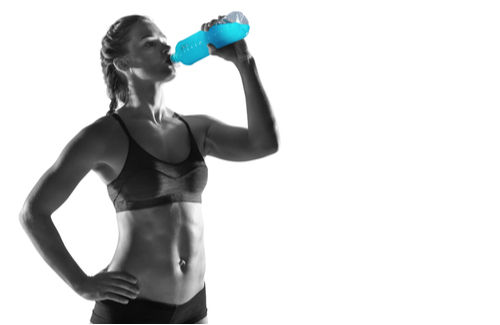General Health
Drinking Too Much Water Can Be A Health Hazard! This Is How
3 min read
By Apollo 24|7, Published on - 28 April 2022, Updated on - 11 November 2022
Share this article
0
13 likes

Growing up we often heard our parents emphasize the importance of drinking plenty of water to stay hydrated, especially during summer. While what they said was true, what they probably didn’t say is worth knowing too. Excess of anything, including water, can do more harm than good.
Drinking too much water can lead to water intoxication, a serious medical condition. Although the risk is generally low, the possibility still exists. Therefore, it is recommended that you familiarize yourself with the symptoms, causes, and effects of overhydration. The article addresses all these points for you in detail below.
What is Overhydration?
Overhydration refers to a condition in which your body holds more water than required. It can occur as a result of chugging too much water or due to a disorder that adversely affects the ability of your body to release water. Water retention can also lead to overhydration.
Too much water in the body can lead to hyponatremia, a condition characterized by dilution of electrolytes, especially sodium, in your blood, which is otherwise required to maintain the fluid balance inside and outside your cells.
When sodium levels in the blood drop below a certain level, outside fluids get inside the cells, causing them to swell. When this happens to the cells in your brain, it can trigger severe symptoms.
Recommended reading: What Is Water Retention: Ways To Lose Water Weight
Symptoms
Depending on how much water you have consumed, the intensity of symptoms can vary.
1. Mild
Some of the initial symptoms of overhydration usually go unnoticed. However, you are likely to be overhydrated if you observe the following changes:
- Colourless urine
- Frequent urge to pee
2. Moderate
If the cells of the body start to swell, the person may experience:
- Nausea and vomiting
- Headaches
- Confusion or disorientation
3. Severe
In rare cases, water intoxication can lead to serious symptoms such as:
- Difficulty in breathing
- Double vision
- Muscle weakness, spasms, or cramps
- Seizures
- Unconsciousness
- Coma
While water intoxication is rare, without timely treatment it can turn fatal.
Causes
High-intensity physical activity is one of the most common causes of overhydration in healthy individuals. The risk is especially high for endurance athletes who participate in sports (such as marathons, ultra-marathons, etc.) and military training exercises.

Nevertheless, overhydration can also be caused by factors, such as:
1. Medical conditions
- Uncontrolled diabetes
- Congestive heart failure (CHF)
- Liver disease
- Kidney problems
- Schizophrenia
- Syndrome of inappropriate antidiuretic hormone
2. Medicines
- Nonsteroidal anti-inflammatory drugs (NSAIDs)
- Diuretics
- Antipsychotic drugs
- MDMA (a synthetic drug also known as ecstasy)
Treatment
Depending on the cause and severity of symptoms, treatment for overhydration may include:
- Limiting the intake of fluids
- Use of diuretics to increase the urine output
- Treating the underlying medical condition
- Replacing the medication responsible for the condition
How Much Water Should You Ideally Drink In A Day?
It is said that men and women should drink at least 3.7 and 2.7 litres of water per day, respectively. However, there is no fixed formula that can help determine how much water you should drink. The water requirement can vary from person to person, depending on factors such as age, gender, health, levels of physical activity, and climate.
While relying on your thirst to drink water may seem appropriate, the approach may not work for everyone, especially athletes, the elderly, and pregnant women. To get a rough estimate, you can take into account your intake of calories. For instance, those consuming 2200 calories a day should consume at least 2200 ml of water. An optimum intake of water is essential for good health. However, drinking too much water can lead to severe health complications, therefore, never go overboard.
General Health
Leave Comment
Recommended for you

General Health
Medications To Treat Conjunctivitis
Discover effective medications to treat conjunctivitis (pink eye). Find relief for red, itchy, and irritated eyes. Get expert advice and options.

General Health
Electrolyte Imbalance: What It Is and How to Prevent It
Often, dehydration is a significant cause of an electrolyte imbalance. To resolve this, one must keep themselves hydrated with fluids that contain added electrolytes.

General Health
A Complete Guide To Constipation: Causes, Home Remedies, and Red Flags
Constipation is a common digestive issue affecting millions worldwide. If not treated in time, it can affect regular routines and quality of life. Read on to know the common causes, home remedies, red flags and more.
Subscribe
Sign up for our free Health Library Daily Newsletter
Get doctor-approved health tips, news, and more.
Visual Stories

The Best Exercises for Controlling Blood Sugar Levels
Tap to continue exploring
Recommended for you

General Health
Medications To Treat Conjunctivitis
Discover effective medications to treat conjunctivitis (pink eye). Find relief for red, itchy, and irritated eyes. Get expert advice and options.

General Health
Electrolyte Imbalance: What It Is and How to Prevent It
Often, dehydration is a significant cause of an electrolyte imbalance. To resolve this, one must keep themselves hydrated with fluids that contain added electrolytes.

General Health
A Complete Guide To Constipation: Causes, Home Remedies, and Red Flags
Constipation is a common digestive issue affecting millions worldwide. If not treated in time, it can affect regular routines and quality of life. Read on to know the common causes, home remedies, red flags and more.